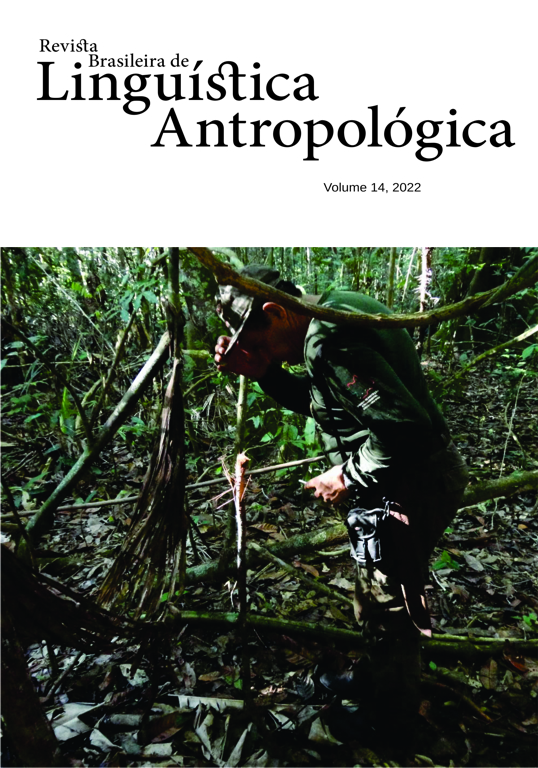Allomorphy of personal prefixes of nominal possession of the mundurukú language (Tupian)
DOI:
https://doi.org/10.26512/rbla.v14i1.43269Keywords:
Mundurukú, Alomorphy, Prefixes, Names, ConditioningAbstract
This paper offers an analysis of morphophonological aspects involving person markers in possessive constructions in Mundurukú. Mundurukú is a Tupian language spoken in Brazil. Previous works, such as Crofts (1984/2004), Gomes (2006) and Picanço (2005), report the existence of person markers, which alternate depending on the class of names (alienable or inalienable) and the noun’s initial segment. However, this work shows the occurrence of more allomorphs than what has been previously reported for the language. We found that in the Mundurukú there are automatic alternations, that is, alternations motivated by purely phonological conditions, in addition to morphonological alternations, that is, those motivated by the morphological or lexical component. We found that the 3rd sg/pl has the highest number of allomorphs and it is mostly governed by morphonological criteria. The other person markers, on the other hand, are automatic alternations, motivated by the name’s initial segment as well as the syllabic patterns.
Downloads
References
Abreu, Natali Nóbrega. 2022. Análise morfofonológica dos prefixos pessoais em nomes da língua Mundurukú. (Dissertação de Mestrado). Universidade Federal do Pará. (em progresso).
Anderson, S.R. 1992. A-morphous morphology. Cambridge: Cambridge University Press.
Aronoff, Mark. 1976. Word formation in generative grammar. MIT Press, Massachusetts: Institute of Technology, Cambridge, Massachusetts.
Borella, Cristina de Cássia; Santos, Eneida Alice Gonzaga .2011. Relatório do Levantamento Sóciolinguístico na Terra Indígena Kwatá-Laranjal. Manaus: UFAM.
Chappel, Hilary; Mcgregor, William. 1996. The Grammar of Inalienability, A Typological Perspective on Body Part Terms and the Part-Whole Relation. Berlin/New York: Mouton de Gruyter.
Crofts, Marjorie. Gramática Mundurukú. Cuiabá-MT: Publicação da Sociedade Internacional de Lingüística. 1973.
Crofts, Marjorie. 1985/2004. Aspectos da Língua Mundurukú. Cuiabá, MT: Sociedade Internacional Linguística.
Gomes, Dioney Moreira. 2006. Estudo morfológico e sintático da língua Mundurukú (tupí).(Tese de Doutorado em Lingüística). Brasília: Universidade de Brasília. Disponível em: https://repositorio.unb.br/handle/10482/3754
Harris, Zellig S. 2004. Morfpheme alternants in linguistic analysis. In Katamba, Francis. (ed.), Morphology: Critical Concepts in Linguistics, /27-39. Londres & Nova York: Routledge. Originalmente publicado em: Language 18 (1942): 169-180.
Haspelmath, Martin; SIMS, Andrea D. 2010. Understnding Morphology. London: Hodder Education.
Brasil. 2021. O Brasil Indígena. Instituto Brasileiro de Geografia e Estatística, (IBGE) Encontrado em: https://indigenas.ibge.gov.br/estudos-especiais-3/o-brasil-indigena/povos-etnias.html
Lieber, R. 1982. Allomorphy. Linguistic Analysis. 10:27-52.
Nichols, Johanna. 1988. On alienable and inalinable possession. In: In Honor of Mary Hass. Univarsity of California, Santa Cruz. Mountoun de Gruyter, Berlim-New York- Amsterdam.
Picanço, Gessiane.2003. Projeção de argumentos dos nomes em Mundurukú. In D. G. da Silva (ed.), Anais do II Encontro do Grupo de Estudos Lingüísticos do CentroOeste (GELCO), Vol. 1. Goiânia: Universidade de Goiânia. 118-125.
Picanço, Gessiane. 2005. Mundurukú: Phonetics, Phonology, Synchrony, Diachrony. (Tese de Doutorado). Columbia, Canadá: University of British.
Picanço, Gessiane. 2012. Introdução ao Mundurukú: fonética, fonologia e ortografia. Universidade Federal do Pará: Cadernos de Etnolinguística. Disponível em: http://www.etnolinguistica.org/mono:3
Rodrigues, Aryon Dall'Igna. 1986. Línguas brasileiras: Para o conhecimento das línguas indígenas. São Paulo: Loyola.
Socioambiental, Instituto. Povo Mundurukú. Povos Indígenas do Brasil. Disponível em: https://pib.socioambiental.org/pt/Povo:Munduruku
Socioambiental, Instituto. Línguas - Povos Indígenas no Brasil https://pib.socioambiental.org/pt/Líng.
Downloads
Published
How to Cite
Issue
Section
License
Copyright (c) 2022 Revista Brasileira de Linguística Antropológica

This work is licensed under a Creative Commons Attribution 4.0 International License.
Authors who publish in RBLA agree to the following terms:
a) Authors maintain the copyright and grant the journal the right of first publication, and the work is simultaneously licensed under the Creative Commons Attribution License, which allows the sharing of the work with recognition of the authorship of the work and initial publication in this journal.
b) Authors are authorized to assume additional contracts separately, for non-exclusive distribution of the version of the work published in this journal (eg, publish in an institutional repository or as a book chapter), with recognition of authorship and initial publication in this journal.
c) Authors are allowed and encouraged to publish their work online (eg, in institutional repositories or on their personal page) at any point before or during the editorial process, as this can generate productive changes, as well as increase impact and citation of the published work.







